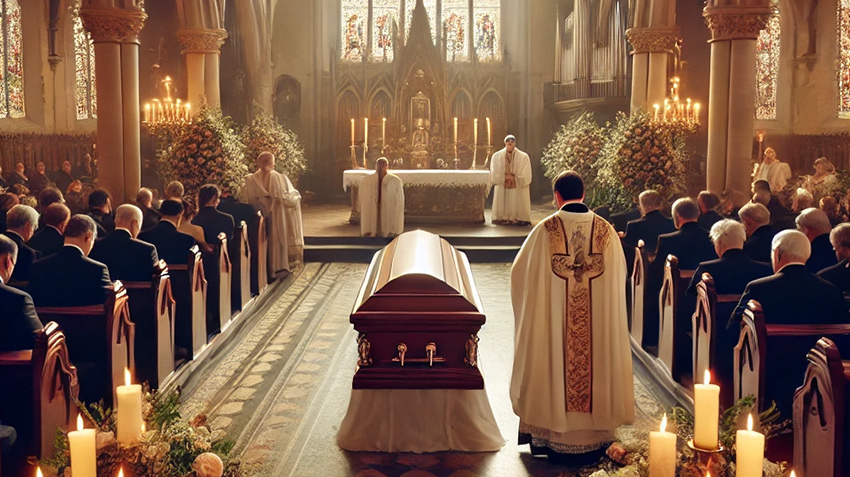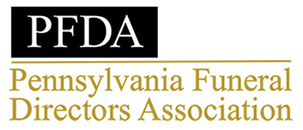
Losing a loved one is a profound and emotional experience, and planning a funeral can add to the burden during an already challenging time.
For those of the Catholic faith, the traditional funeral rites provide a structured way to honor and remember the deceased while seeking spiritual comfort. This guide aims to offer clarity on the key elements of a traditional Catholic funeral, helping you navigate the process with respect and understanding.
Traditional Catholic funerals are deeply rooted in the Church’s traditions and teachings, designed to offer spiritual support and honor the deceased’s faith. According to the Association of Religion Data Archives (ARDA) at Pennsylvania State University, the Roman Catholic Church was the largest religious body in Pennsylvania in 2020, with over 2.8 million adherents. This reflects the significant role Catholic traditions play in the lives of many individuals and families.
What you need to know about Catholic funerals
Here are a few important factors you need to understand about a traditional Catholic funeral:
1. The Vigil Service (Wake)
The vigil service, or wake, serves as a time for family and friends to come together to pray, offer condolences, and remember the deceased. This gathering is not just about mourning but also about supporting each other and finding solace in shared faith.
2. Location and Atmosphere
The vigil can be held at a funeral home, your family’s home, or even at the church, depending on the preferences of the deceased and your family. This more informal setting allows people to come and go as they please, creating a space for personal reflection and communal support. Setting up an altar with a crucifix, candles, and photos of the deceased can help create a respectful and prayerful atmosphere.
3. Prayers and Readings
The vigil typically includes scripture readings, prayers, the Rosary, and sometimes eulogies. Selecting appropriate Bible passages that reflect themes of hope, resurrection, and eternal life can offer comfort. Including the Rosary or other traditional prayers like the Divine Mercy Chaplet can also be a meaningful part of the vigil.
4. The Funeral Mass
The funeral Mass, or requiem Mass, is the central liturgical celebration of a Catholic funeral. It serves as a profound expression of faith and a time to commend the deceased to God’s mercy.
The Mass includes several essential elements:
- Liturgy of the word: This part includes Bible readings that offer spiritual reflection and comfort
- Eucharist: The celebration of the Holy Communion signifies the eternal bond with Christ and the Church community
- Hymns and sermons: Hymns such as “Amazing Grace” or “On Eagle’s Wings” enhance the solemnity of the Mass, while the priest’s sermon provides spiritual guidance and comfort.
- Prayers for the deceased: Specific prayers are offered to ask for God’s mercy and guidance for the deceased’s soul.
Here are some other factors you should consider:
5. The Involvement of Family and Friends
Family members and close friends often take on roles such as readers or gift bearers, contributing to the personal and communal nature of the service. Coordination with the church for altar servers and Eucharistic ministers ensures a smooth and respectful celebration of the mass.
6. The Committal (Burial or Interment)
The committal service is a brief but poignant ceremony held at the graveside or crematorium. It marks the final farewell and provides a sense of closure for the family.
7. The Burial Site
If possible, opting for a Catholic cemetery is advisable, as these sites are consecrated and reflect Catholic beliefs about death and resurrection. The headstone or marker may include Catholic symbols such as a cross or an image of a saint to honor the deceased’s faith.
7. The Rite of Committal
The Rite of Committal includes prayers and blessings that entrust the deceased to God’s care. This final act of care and the presence of family and friends provide a sense of communal support and peace during this solemn moment.
What you should do to respect the deceased’s faith and wishes
If your loved one is a devout Catholic, you should consider the following:
1. Following Traditions
Catholic funerals are rich in tradition, providing comfort and a sense of continuity for the bereaved. Observing all prescribed rites—from the vigil service to the funeral Mass and committal—honors the deceased’s faith and provides spiritual support to the family.
2. Communicating with Clergy
Early communication with the parish priest is crucial. The priest will guide the liturgical aspects of the funeral, ensuring alignment with Catholic teachings and practices. This guidance helps maintain the integrity of the religious rites and supports the bereaved through the planning process.
Navigating practical considerations
Here are a few practical considerations you shouldn’t ignore:
1. Discussing Funeral Costs
Planning a funeral involves various expenses, from the vigil and Mass to the committal. It is important to discuss these costs with the funeral home and the church to find arrangements that suit your budget. Look into community assistance programs if financial difficulties arise.
2. Scheduling and Logistics
Coordinate with the church, funeral home, and cemetery to schedule dates and times. Ensure all parties involved are aware of the schedule to avoid any logistical issues. Arranging transportation for out-of-town family members and providing information about local accommodations can also ease the burden during this time.
Frequently Asked Questions
Below are some commonly asked questions about Catholic funerals:
1. What is a memorial Mass, and how does it differ from a funeral Mass?
A memorial Mass is similar to a funeral Mass but without the body present. It can be held at a later date and focuses on praying for the deceased’s soul.
2. Can a cremation be part of a Catholic funeral?
Yes, the Catholic Church allows cremation, provided it is not chosen for reasons contrary to Christian teachings. The cremated remains should be treated with the same respect as a body, typically buried or entombed.
3. Can a Catholic funeral be held on a Sunday?
While possible, it is uncommon due to the regular Sunday Mass schedule. Funerals are typically held on weekdays or Saturdays.
Speak to a funeral home about traditional Catholic funerals
Planning a traditional Catholic funeral involves a series of meaningful rites and rituals that honor the deceased’s faith and provide comfort to the bereaved.
If you’re not sure about how to go about planning a Catholic funeral service, speak to a reputable funeral home that offers professional funeral services. They have years of experience in handling all kinds of funerals and will help you plan a meaningful send-off for your loved one.



